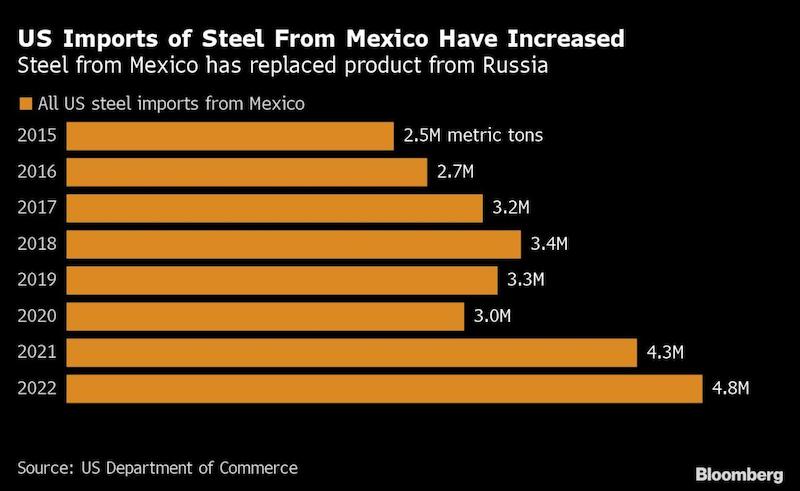Steel is threatening to become the latest area of commercial conflict between the US and Mexico after a bipartisan group of US lawmakers called on the Biden administration to restore Trump-era tariffs if necessary to stem a surge in imports.
A group of more than a dozen US senators, including Republican Tom Cotton of Arkansas and Democrat Sherrod Brown of Ohio, wrote to and Commerce Secretary Gina Raimondo and US Trade Representative Katherine Tai last week, asking them to engage Mexico in talks over rising US steel imports. They cited an almost sevenfold jump in imports of steel conduit used in construction.
The lawmakers suggest applying quotas, but raised the possibility of reimposing duties used previously by the Trump administration that were removed in May 2019.
Mexican senators shot back this week, passing a resolution calling on the nation’s economy ministry to start gathering information about US exports to Mexico in order to consider retaliatory measures if Washington were to reimpose the duties.

Despite the senators’ complaints, it would be surprising if USTR or Commerce move forward on requesting consultations given the number of disputes already in progress, said Juan Carlos Baker, a founding partner of consulting firm Ansley Consultores Internacionales and one of the top negotiators for the US-Mexico-Canada Agreement that took effect in 2020.
“Mexico and the US are already discussing some serious issues,” he said. “I’m sure that nobody really wants to add more trouble to a relationship that already is being tested.”
A Commerce official said that the department had received the senators’ letter and will respond through appropriate channels. A USTR spokesman also confirmed receipt, saying the agency is reviewing it.
List of Issues
Should the US request consultations, steel would join a growing list of trade issues between the neighbors: talks on Mexico’s nationalist energy policy are now in their sixth month, and there is a brewing dispute over corn.
Mexico is the second-largest US trade partner, with the nations trading almost $800 billion of goods in 2022 alone.
While the percentage of US steel imports arriving from Mexico has risen, it’s because Covid-19 disruptions and the Ukraine war have made Mexico a more reliable provider, replacing other exporters like Russia, Mexican industry association Canacero said on Friday.
The US lawmakers “appear to be threatening to disrupt efforts by both countries to cooperate in shortening supply chains to enhance national security, economic growth and employment,” the Mexican chamber said.
The complaints come as US steelmakers are seeing profits cool significantly from the records they enjoyed in 2021 and 2022. Domestic steel prices are down about 47% from historic highs reached in August 2021. And steel mill-utilization is now at just 74% of full capacity, according to American Iron and Steel Institute data.
Steel executives have long argued that utilization must be above 80% for the industry’s long-term viability and financial health. Compounding the issue is that monthly raw-steel production by the nation’s mills are at the lowest since the pandemic, when demand all but evaporated as countries across the globe shuttered economic activity and imposed lockdowns.
The Trump administration imposed 25% tariffs on steel from Mexico and a number of countries under section 232 of America’s Trade Expansion Act of 1962, saying that the imports posed a threat to national security. Those duties were dropped in 2019, with the caveat that they could be reimposed if imports from Mexico surged “meaningfully beyond historic volumes of trade.”
The US lawmakers cite a 73% increase in the volume of US iron and steel imports since the 2015-17 period, while inward-bound shipments of semi-finished steel and long products have more than doubled.
They say that Mexican imports have contributed to the loss of more than 200 steel jobs in California and led to the closing of one of fewer than a dozen American factories that produce steel conduit.
“Many steel producers are concerned that additional production cuts, layoffs and plant closures are imminent,” the senators said. “The administration must act now to avoid further damage.”
The US senators’ appeal was cheered by the Coalition for a Prosperous America, an organization that represents import-threatened companies and unions.







